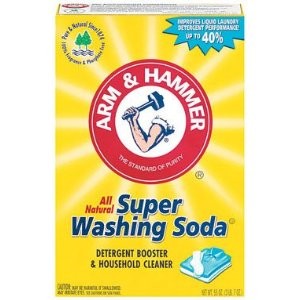Until beginning this life adventure on the farm, I had never heard of washing soda. I’ll bet that most people today have also not heard of this product. Even auto-correct keeps changing “washing soda” into “Washington”. Looks like auto-correct needs some more training, but I digress. Washing soda, actually sodium carbonate, is chemically similar to baking soda and most washing soda today is made by the historic manufacturer, Arm and Hammer.
Since popularity of use declined over the late 20th century, washing soda can be difficult to find in local stores; however, it is easily found online. At about $3.25 for a 55 ounce box, it is an economical addition to your laundry (and other cleaning) arsenal.
When you live on a farm, your clothes get dirty. Really dirty. And using the word “dirty” is using the nice word. Thus I began my search for the best, most efficient, most economical, most in line with self-sufficiency/ homesteading, non-bleach laundry products. Sure, no problem! I also needed something that could blast out ground in Tennessee red clay mud, grass/ vegetation stains, general oil and grime, and the other less mentionable farm stains without totally destroying the fabric in a few washings as would bleach. Believe me, I see the utility of bleach in some laundry situations and I use it accordingly - but bleach and I are not BFFs. No matter how careful I am when using bleach, it seems that I always manage to get a drip or two on whatever I am wearing or on some other garment in the laundry room.
While looking for this unknown but seemingly magical laundry product, I began making my own liquid hand soap (see earlier post for recipe). In doing research for the liquid soap recipe, I found several recipes for homemade laundry soap. These laundry soap recipes all had one ingredient in common: washing soda. Found it at the local Wal-Mart in the laundry section next to the laundry bar soaps and stain removers. Used it once. Bingo. I’ve been using it when needed ever since.
The front of the box states that it is “All Natural Super Washing Soda” and “Detergent Booster and Household Cleaner”. The top of the box displays Arm and Hammer’s Environmental Commitment, which show that Super Washing Soda is an environmentally acceptable alternative to other household products. While not exactly sure what that statement means, A&H washing soda has been in use since 1874 and is 100% fragrance and phosphate free.
The back of the box displays the expected directions for use as well as a listing of the types of stains that can be removed when used as a booster to your existing laundry detergent. To be clear; washing soda is intended to be used in addition to your regular detergent. Put to use as an addition to my normal detergent, washing soda has drastically improved the stain removal and brightening in my laundry. I use a half cup in almost every load. Love the stuff. Not to sound too much like a TV commercial but even my husband noticed that our “grubby” clothes used for around the farm chores were looking better - now that’s amazing.
Types of Stains (from the back of box):
Greasy Dirt Stains Food Stains Other Stains
- Perspiration stains - Mustard - Make-up
- Collar & Cuff stains - Chocolate - Blood
- Blueberry - Grass
- Cola - Clay
- Meat &
Grease spatters
- Olive Oil
Chemically speaking, washing soda is a water softener. This helps it lift stains before they completely bond to the fabric.
Like it’s cousin, baking soda, washing soda has other applications than just laundry. It can be used as a general household cleaner both indoors and outdoors. It is particularly useful for cleaning kitchen or cooking grease, oils, and crayon. Washing soda should not be used on aluminum surfaces or on no-wax floors. It can also be used as a sink trap and drain cleaner. I have personally used this in my slow-draining kitchen sink and one application (1/2 cup per gallon of HOT water then flush with HOT water) alone totally cleared up the problem.
Hope this treatise on such a fascinating topic resonates with some of you, Dear Readers. Check out washing soda. It’s a versatile product and environmentally sound. It doesn't go bad. And if you decide you might want to start making your own laundry soap? You'll need it then. But that's a post for another day.
Until then!
** Washing soda SHOULD NEVER be used as a substitute for baking soda. **
- Collar & Cuff stains - Chocolate - Blood
- Blueberry - Grass
- Cola - Clay
- Meat &
Grease spatters
- Olive Oil
Until then!

No comments:
Post a Comment